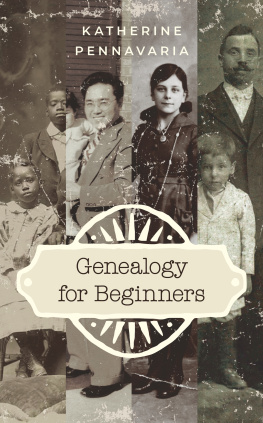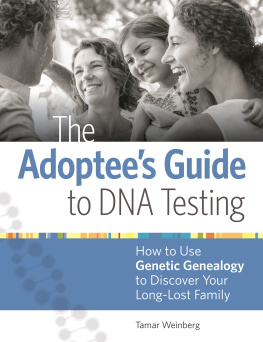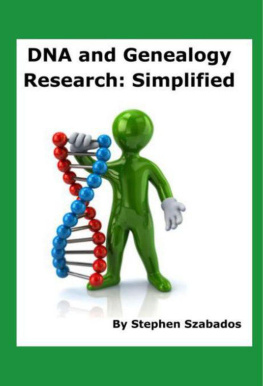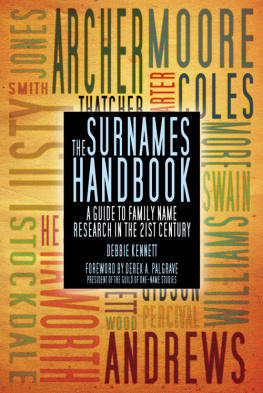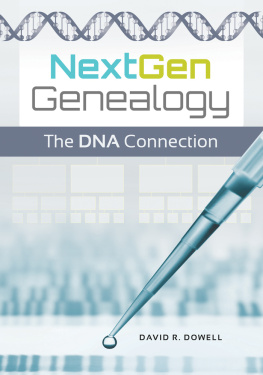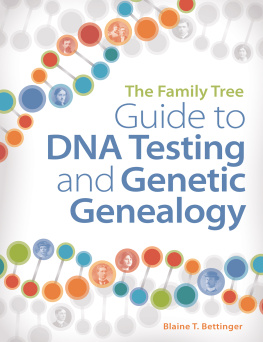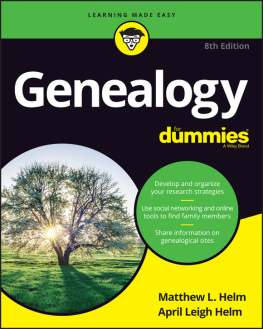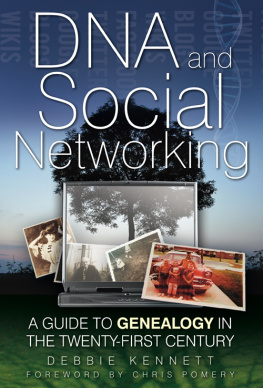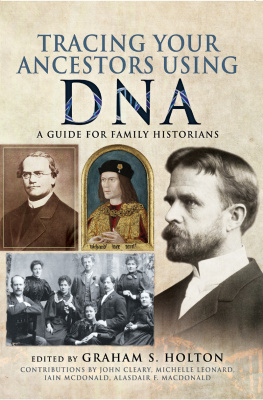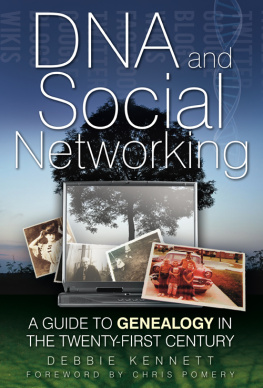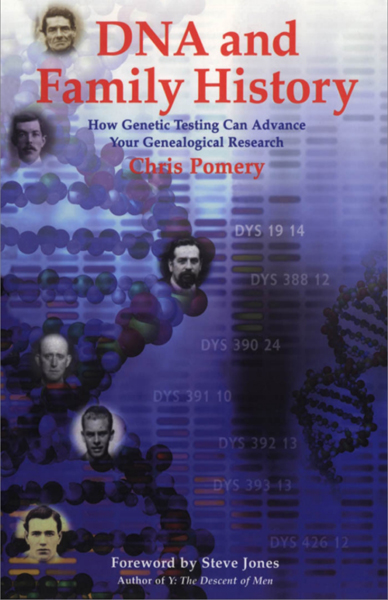DNA and Family History
How Genetic Testing Can Advance Your Genealogical Research
Chris Pomery

THE DUNDURN GROUP TORONTO
For Vince, Jill, Alexander and Edmund, who all had great fun stimulating me to start this book, and not forgetting a friendly cuff for the three OBrien family cats Eric, Ernie and the aged Roland who have used every feline means to prevent me from accessing the keyboard to complete it.
Chris Pomery 2004
This edition of DNA and Family History is published by arrangement with
The National Archives, UK.
The right of Chris Pomery to be identified as the Author of this Work has been asserted by him in
accordance with the Copyright, Designs and Patents Act 1988.
All rights reserved. No part of this publication may be reproduced, stored in a retrieval system,
or transmitted in any form or by any means, electronic, mechanical, photocopying, recording, or
otherwise (except for brief passages for purposes of review) without the prior permission of
Dundurn Press. Permission to photocopy should be requested from Access Copyright.
Library and Archives Canada Cataloguing in Publication
Pomery, Chris
DNA and family history : how genetic testing can advance
your genealogical research / Chris Pomery.
Includes bibliographical references and index.
ISBN 1-55002-536-8
1. Genealogy. 2. DNA. 3. Genetics. I. Title.
CS21.P64 2004 929.1072 C2004-904460-5
1 2 3 4 5 08 07 06 05 04
Editorial, design and production by The Book Group,
Somerset Printed in the UK by Cromwell Press
www.dundurn.com
Dundurn Press
8 Market Street, Suite 200
Toronto, Ontario, Canada
M5E 1M6
Dundurn Press
2250 Military Road
Tonawanda NY
U.S.A. 14150
C ONTENTS
L IST OF F IGURES AND T ABLES
F OREWORD
M an, unique among animals, can live in the past. History is the cement that binds society together, and its continued popularity is proof that even in the days of the worldwide web many people still anchor their identity in the notion of shared descent. Nowadays most nations find their essence in politics rather than blood but even that rational idea rests on an insight into a common past.
What is true for nations is just as true for families. As a result, many enthusiasts spend years in the record books, and on the web, tracking down just who their own ancestors may have been and from whence they came.
Once, that job was hard indeed and the results were often ambiguous. Now, everything has changed. DNA is the icon of the twenty-first century and the key to all those that preceded it. The double helix has turned each of us into a living fossil: we carry in its imprint the history of our forebears, subtly changed by mutation. From the genes we can trace the origin of our families, our nation and, in the end, of mankind itself.
The problem with family trees is that they have so many branches. Everyone has two parents, four grandparents, eight great-grandparents and so on, and even allowing for the fact that each of us is inbred (for we all share common ancestors to some degree) the numbers soon become impossible to deal with. I probably descend, through one branch or another, from William the Conqueror but so do you, and so do millions of others, which slightly takes the gloss off the discovery.
One set of genes escapes that problem. They are on the Y-chromosome, inherited like a surname down the male line. The Y is an arrow of manhood that flies from Adam to every man alive today. In principle all men (and their wives and daughters, for they too have fathers) can use it to search out one crucial ancestor out of millions.
Chris Pomery has written a book that tells them how. It is for everyone who is interested in their own past; and who is not? Genetics, like many sciences, is filled with jargon, which can be hard to translate. As a result, people sometimes find it hard to understand quite what the subject can and (more important) can not do. When it comes to the search for ancestors, DNA and Family History puts them right.
It concentrates on the tie between surnames and genes. My own surname, Jones, began only in the eighteenth century, when the English pattern of family names spread to Wales. Even worse, it had many origins, for it means simply son of John (as, for that matter, do the names Evans, Jenkins and Johnson). However feeble the evidence of my second name, my genes have given me a family. My Y-chromosome is of a type common in Wales and Ireland but rarer on the eastern side of England, which proves that, in the male line at least, I spring from ancient Celts. That slightly cheers me up, but I am happy to accept that the descendants of Saxons or of Slovenes would be equally pleased to trace their own roots.
Genetics ties the human family together as much as it divides it. Its most remarkable contribution has been to show how much we are alike. Compared to our relatives chimpanzees, gorillas, and so on Homo sapiens is astonishingly uniform from place to place. The average genetic difference between, say, a tribe of Aborigines and the population of Wales is less than between two groups of chimpanzees living a couple of hundred miles apart in Africa. We have evolved in our minds far more than in our bodies, and our ability to understand the past is a central part of what makes us so much more than apes.
DNA opens a new window into history. It can tell anybody who wants to find out exactly where on the human family tree they belong. This book shows, in a very clear and straightforward way, how to start looking.
Steve Jones
Professor of Genetics
University College London
P REFACE
I first became interested in DNA testing back in April 2000 when I read a summary of the results of Professor Bryan Sykes ground-breaking Sykes surname study on the BBC website. My unsolicited comments were graciously replied to and six months later the Pomeroy DNA surname study was well under way in Bryans lab at Oxford University.
As I delved deeper I began approaching academics around the planet in order to understand more about the power of genetic analysis, regularly receiving emails offering both enlightenment and encouragement. While DNA studies are, like astronomy, genuinely an area where an amateur enthusiast can have a significant impact on humanitys overall understanding, I confess that the learning process has to date been largely one-sided.
Some of the material in this book grew out of a website, hosted first on Genuki and later on Rootsweb, which I set up in 2001 to track the growth of genetic genealogy. This site has been expanded, rewritten and given its own domain to coincide with the publication of this book. Youll find that each chapter has its own set of online resources that you can access through the website, including notes that expand on all of the topics indicated throughout the text. You can also keep track of this subject as it develops by subscribing to my email newsletter.
The website is also a feedback route for you to pass your comments to me. If you think Ive erred or missed out something important either in this book or in the resources online then email me. I value hearing from readers but please let me beg forgiveness in advance if I do not guarantee to reply to every email individually.
This books companion website
DNA test price information


